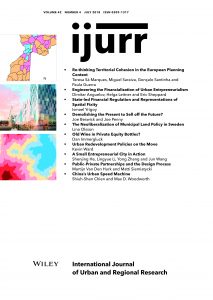Urban entrepreneurialism and neoliberal urban governance are assuming new forms under finance‐dominated accumulation. We examine and contribute to theorizing the mechanisms through which urban governance is financialized, taking as a case study JESSICA, one of the European Union’s initiatives to implement an ‘urban sensitive’ policy for sustainable and integrated development. Like other initiatives promoting financialization, JESSICA deploys the logic of finance to select and fund urban social initiatives and development projects on the basis of their potential return on investment (ROI). Understanding this process requires placing questions of political economy—how urban governance is shaped by the broader political‐economic context—with questions of governmentality—how stakeholders are enrolled in and come to take for granted new governance initiatives. Following the multi‐scalar institutional infrastructure is crucial to understanding how this works. Taking a relational multi‐scalar approach, we trace how changes at the supranational scale filter down to shape urban policy selection and performance in Sofia, Bulgaria, where we document how ROI calculations conflict with social welfare priorities. Contrasts between the trajectory of financialization of urban governance in the European Union and the United States demonstrate how this is geographically variegated, shaped by the broader context/conjuncture within which such financialization is embedded.
Details
Written by:
Dimitar Anguelov, Helga Leitner & Eric Sheppard
Digital Object Identifier (DOI)
10.1111/1468-2427.12590
About DOI

